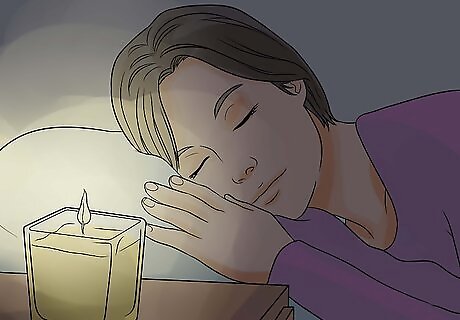
views
X
Trustworthy Source
PubMed Central
Journal archive from the U.S. National Institutes of Health
Go to source
Keep your energy high by doing things to keep your mind and body alert, like exercising or talking to someone. Adopt some healthy habits into your lifestyle to maximize your energy. If you have any questions about your medication, don’t hesitate to contact your prescriber and discuss your concerns.
Staying Awake Now

Get outside to regulate your circadian rhythm. Some fresh air can help to keep you awake and alert. If you tend to stay inside much of the day, take a few breaks and head outside. Getting some sunlight (especially in the morning) can help regulate your waking and sleeping cycles so that you’re fully awake during the day and can sleep well at night. Take a walk during your lunch break or ask to meet with people outside. For example, if you have a dog, go for a walk each morning so you can maximize your sun exposure.

Talk to someone as a way to stay engaged. Engaging in social activities can help to keep you alert and involved. Find a friend to talk to. This might also be a good time to make any necessary phone calls. Avoid using instant messaging to communicate; it’s best to speak in-person or over the phone to stay awake. Talk to another student or co-worker throughout your day. Schedule regular meetings so that you can be continuously engaged.

Grab a healthy snack when you’re hungry and sleepy. Avoid reaching for the sugary snacks and grab something that will give you long-lasting energy. For example, try eating a handful of nuts or a bowl of fresh fruit. Spread some nut butter on a whole grain cracker or eat a yogurt. When you get a craving for a snack, get in the habit of fueling yourself for long-term energy to help avoid any lows that might make you drowsy or tired.

Move your body to increase your blood flow for energy. If you’re struggling to stay awake, get up and take a 10-minute walk. Moving around can increase blood flow and provide oxygen throughout your body. Simple movement can help increase energy for up to 2 hours. If you can’t take a walk, do some stretches or movements to wake up your body. Try some jumping jacks or burpees. If possible, use the gym or attend a yoga class in the morning or during lunchtime.

Use a supplement for energy. Adding a supplement to your day can help to increase energy and keep you awake. For example, B vitamins are known to help increase energy, especially if your diet is low in B vitamins. However, beware of supplements that promise energy without any research or support. Speak to your physician before starting any new supplements or medications. Be cautious of using stimulants like caffeine as they can increase feelings of anxiety. Caffeine may also affect the quality of your sleep.
Making Lifestyle Changes

Sleep well each night. Not getting enough sleep can result in struggling to stay awake, especially when you take Xanax. Stick to good sleeping habits to maximize your waking and sleeping states. If you have a hard time falling asleep, try sticking to a regular bedtime and wake-up time, even on the weekends. Artificial light from the television or electronic devices (such as tablets and smartphones) can disrupt your sleep, so keep them out of your bedroom, especially at night. Try a relaxing bedtime routine each night. For example, take a bath, light a candle, sip on tea, and dim your lights. This can help you unwind and feel calm. Keep in mind that short naps (under 30 minutes) will not make up for lost sleep, but they can help to improve your mood.

Eat a nutritious diet. The foods you consume can contribute to your energy levels, so focus on nutrient-rich foods that will fuel your body and mind. Eat foods with whole grains and that are rich in fiber. Eat plenty of fruits and vegetables and avoid eating many foods that are processed or high in sugar. Eat healthy meals regularly. Treat yourself to less nutritious foods on occasion. For example, create a healthy daily meal plan such as oatmeal and fruit for breakfast, a sandwich with raw veggies for lunch, a fruit smoothie for a snack, and roasted vegetables with rice for dinner. Get in the habit of planning your meals so that you can ensure that they’re tasty and nutritious.

Exercise and move around. Regular exercise can build your muscles and increase your overall energy. In addition to physical and emotional benefits, exercise can boost your mood and improve your sleep at night, making you less sleepy during the day. Aim to get 150 or more minutes of exercise each week. Create a weekly schedule which includes regular exercise. Take a class at your local gym, go for bike ride, attend martial arts classes or yoga sessions. Whatever you do, do it regularly to reap the best benefits of exercise.
Cut out smoking and alcohol. Long-term nicotine use can cause a change in your arousal levels and it may also lead to other unwanted effects on your adrenal system, which can contribute to drowsiness. Alcohol can contribute to fatigue and it also affects the quality of your sleep. Try to avoid smoking cigarettes (or using other nicotine products) and drinking alcohol while you are taking Xanax to help reduce drowsiness.
Obtaining Medical Intervention

Monitor your symptoms. Track when you feel tired, how long your sleepiness lasts, and any changes you’ve noticed since taking Xanax. Write down what you try to alleviate the sleepiness and if it helps. Write down your symptoms in a notebook or use a phone application to track them.

Tell your prescriber about your sleepiness. Once you’ve tracked your symptoms, share them with your prescriber. Present this information to your prescriber so that they can see what your symptoms are, how long they last, and what interventions you’ve tried. Your prescriber may choose to adjust your dosage or switch medications for you. Keep in mind that medications inherently have side-effects that may be unpleasant. You may need to decide whether your sleepiness is livable and if the positives of Xanax outweigh the costs.

Ask about alternative medications. If you find it too difficult to stay awake and you’ve tried various methods, it may be time to discuss changing medications. If you take medication for anxiety long-term, consider switching to another type of anti-anxiety that doesn’t induce drowsiness. For example, ask your prescriber about taking selective serotonin reuptake inhibitors (SSRI) medication, which have a lower chance of dependency and may have different side-effects. SSRI medication also is safe for long-term use. Talk to your prescriber to see if this medication is right for you.




















Comments
0 comment